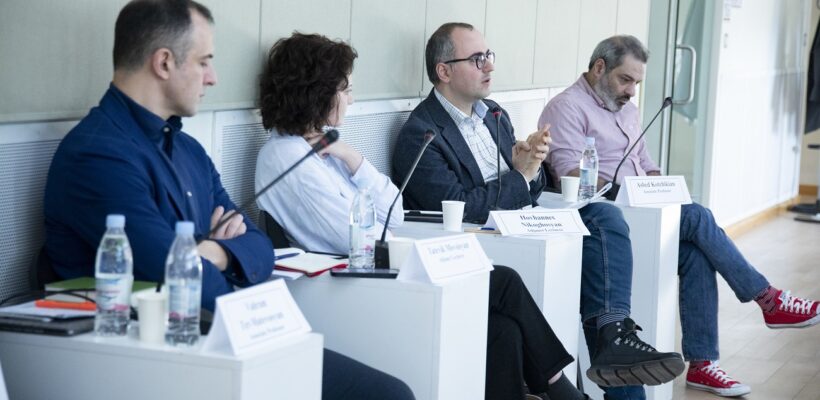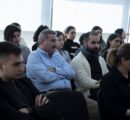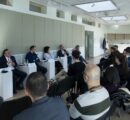
PSIA and BAPG Hold Panel Discussion on Armenia’s Foreign Policy
3 min readYEREVAN, Armenia — On February 24, the American University of Armenia (AUA) Master of Political Science and International Affairs (PSIA) program and Bachelor of Politics and Governance (BAPG) program held a panel discussion titled “Does Armenia Have Partners in War and Peace?” The panelists were Associate Professor and Assistant to the Interim President on Academic Affairs Dr. Vahram Ter-Matevosyan, and adjunct lecturers Dr. Hovhannes Nikoghosyan, Dr. Tatevik Movsisyan, and Dr. Arsen Gasparyan. Associate Professor and PSIA Interim Program Chair Dr. Asbed Kotchikian moderated the panel discussion and shared his views on the topic.
As current narratives about Armenia’s foreign policy and alliances maintain, in the aftermath of the 44-Day War and due to the unraveling of new conflicts in the wider region and geopolitical shifts, these are challenging times for all small states, in general, and for Armenia, in particular. The panel discussion challenged these narratives by offering theoretical and analytical frameworks for the examination of how foreign policies are made in Armenia, Russia, Turkey, and other relevant states.
Dr. Movsisyan kicked off the panel discussion by interpreting foreign interests in the region from a broader international relations theory perspective. She put forth the neorealist paradigm placing emphasis on system-level attributes and various schools of thought that portray the destabilizing role of power transitions within the international system. Looking from that lens, foreign interests can be perceived as grounded on a power competition between the hegemon and rising challengers, and our region can be seen as a stage for such competition where the West simultaneously meets both Russia and Iran.
In his turn, Dr. Nikoghosyan addressed how foreign policy analysis as a discipline suggests to unveil the processes and outcomes of foreign policy. He highlighted that foreign policy scholars propose focusing on understanding the factors that influence foreign policymaking processes and decision makers. Thus, placing emphasis on analyzing the individual characteristics of political leaders and structure of decision-making bodies, which in most countries is the National Security Council, will avail a much wider scope of analysis, as opposed to mechanically applying the theories of international relations. Armenia, he maintained, is not an exception, even though it lacks first-hand accounts and scrutiny of power holders by the media.
Dr. Ter-Matevosyan followed, first recalling the panel discussion on “Ukraine, Russia, and Beyond” organized by PSIA on the same day in the previous year, which had coincided with the start of the war between these countries. He touched upon the implications of the Russia-Ukraine war on Armenia and discussed the problems of binary fallacy and mechanistic determinism in Armenia’s thinking about history and geopolitics, positing that ambivalence of characterizations and defiance of the new rules of regional modus vivendi have had long term implications on Armenia’s understanding and contextualization of geopolitical trends.
Speaking last, Dr. Gasparyan reflected on the topic discussing the objective parameters that the Armenian government has to deal with. He touched upon the new balance of power in the region, adding that Armenia must reconfigure its foreign policy strategy: besides the judicious economization of foreign policy, the self determination of Artsakh should be the major component of Armenia’s foreign policy. Dr. Gasparyan also stressed the importance of improving relations with the Armenian diaspora since, in his view, these relations have changed after the recent Artsakh war.
The discussion was followed by a Q&A session, during which students and faculty members had the opportunity to expand on the topic and seek further insight into Armenia’s foreign policy, as well as on how regional issues and foreign interests may impact Armenia and its citizenry. The recording of the panel discussion is available online.
The Political Science and International Affairs (PSIA) program of the American University of Armenia (AUA) equips students with advanced analytical reasoning, critical thinking, and communication skills through the study of political science and international affairs, emphasizing local and global perspectives and practical applications of theory. The program provides world-class teaching and research, producing graduates who can best contribute to the development of the nation.
AUA is pleased to announce the launch of its two new graduate degree programs: Master of Arts in International Relations and Diplomacy (MAIRD) and Master of Public Affairs (MPA) in the College of Humanities and Social Science (CHSS). The two degree programs are set to begin in Fall 2023. There will be an online information session about the two degrees on Saturday, March 11 at 11 a․m.









